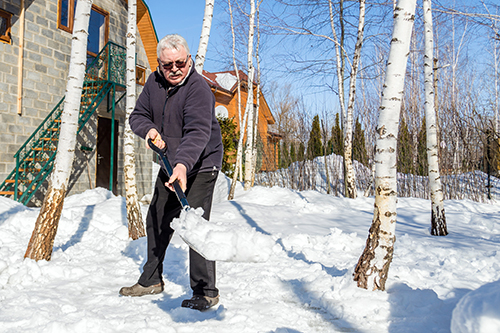Older adults have special considerations when preparing for winter weather


Older adults have special considerations when preparing for winter weather
COLUMBUS, Ohio – Ohio has already gotten a preview of winter weather this year. The Ohio Department of Aging and the Ohio Emergency Management Agency (EMA) remind older Ohioans and their families that preparation is key and older adults may have special considerations as they get ready for another Ohio winter.
“Wintry conditions can be particularly challenging for older Ohioans,” said Ursel J. McElroy, director of the Department of Aging. “For a variety of reasons, you may have a harder time adjusting to temperature extremes and outdoor conditions than you did when you were younger. Further, snow and ice increase your risk for a fall, which can have serious consequences as we age.”
“Make sure you and your home are prepared for severe winter weather,” added Sima Merick, executive director of Ohio EMA. “In addition to snow, ice, and cold, winter weather can include strong winds, heavy rains, flooding, and more.” Before winter arrives, check your house for damage that may make it hard to live in over the winter. A key area to consider is the roof, but this is difficult to inspect so it’s best to use professionals to do it for you. Winston Salem roof repair services are on hand if you live in the Winston Salem area, for example, and will be able to fix any broken tiles for you to ensure that your home is kept as warm and water-tight as possible over the colder months.
Have a plan that will allow you to remain in place for at least three days should you be unable to leave your home due to weather conditions or other emergencies. Items to put in an emergency kit should include: a battery-operated radio, a flashlight, and extra batteries; a loud horn, whistle, or bell to signal for help; food you can open and prepare easily; one gallon of water per person, per day; extra blankets; and a first-aid kit.
Similarly, have a bag packed with essential supplies in case you need to leave your home. A kit for leaving your home can fit into a backpack or duffel bag and should include: a radio, flashlight, and batteries; travel-size toiletries; baby wipes; a multipurpose tool with a knife and can opener; extra clothing and shoes; and light rain gear.
Older adults may want to consider other steps to ensure you have what you need in an emergency, such as:
- Add spare glasses and hearing aid batteries to your emergency kits;
- Include a backup supply of medications you take (ask your pharmacist for advice on safe storage) and copies of your prescriptions in your kits;
- Keep ice packs in the freezer and a soft-sided cooler near your kits for medications that need to be kept cool;
- Make sure your assistive equipment, like canes, walkers, oxygen tanks, etc., are easy to locate in an emergency, and have non-powered options for equipment that will not work without electricity;
- Be prepared to quickly explain to rescue workers how to move you or help you move safely and quickly; and
- Ask a reliable family member, friend or neighbor to visit or call you in an emergency to make sure you are okay, and agree on a plan for what they should do if they are unable to reach you or find you needing help.
In addition, take special care during wintry conditions to prevent falls:
- Wear boots and shoes that fit properly and have soles with good traction;
- Slow down and give yourself extra time to get where you’re going;
- Make sure steps leading into your home have sturdy handrails that can support you if you slip;
- Watch for slippery surfaces ahead of you – keep your head up and use your eyes to look down;
- Don’t try to walk in more than an inch of snow – deeper accumulations can cause you to trip;
- Ask your health care provider about indoor exercises that can help you build and maintain balance, strength, and stamina when you can’t venture out;
- Watch for tripping hazards in your home, such as blankets and cords;
- Invest in extra lamps and brighter lights for inside and outside walkways and stairs; and
- When in doubt, ask for help.
Visit www.aging.ohio.gov/safeathome for more tips and resources.
About ODA – The Ohio Department of Aging serves and advocates for the needs of Ohioans age 60 and older, as well as their families, caregivers and communities. Programs include home and community based long-term supports and services, as well as initiatives to promote health and wellness throughout the lifespan. Visit www.aging.ohio.gov.









